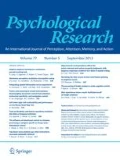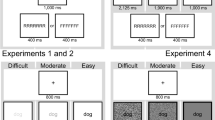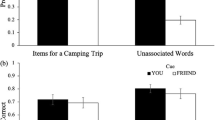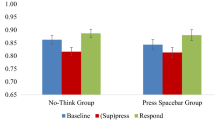Abstract
Directed forgetting (DF) or intentional forgetting can impair the recall of items cued to be forgotten (so-called cost) but can also improve the recall of items cued to be remembered (so-called benefit), following the cost–benefit principle. However, whether the forget cue is the cause of intentional forgetting is doubtful. Several studies suggest that intentional forgetting is extremely hard by introducing a noncue condition, but it is not enough to explain how the cost–benefit principle works without forgetting. Here, two series of experiments are designed to test the voluntary control ability of attentional resource allocation from memory benefits to costs. In the Experiment 1 series, we changed the position and content of cues, replicating the DF effect and the analogous effect without a forget cue. The results showed that precueing can mildly upregulate memory attentional resources to improve performance while incurring memory costs for other items. Since forced remembering can also induce memory costs and benefits, the cost–benefit principle may not be attributed to DF. In the Experiment 2 series, we further demonstrated that memory costs and benefits exist when implicit cues are employed. Overall, when the results of all memory costs in the above experiments are compared with a noncue condition as the baseline in Experiment 2c, there exist no significant differences. The current results indicate that we can voluntarily upregulate our memory performance for certain items but cannot voluntarily downregulate memory encoding, generalizing the selective attentional resource control account to the cost–benefit principle beyond the directed-forgetting effect.

















Similar content being viewed by others
References
Anderson, M. C., & Hanslmayr, S. (2014). Neural mechanisms of motivated forgetting. Trends in Cognitive Sciences, 18(6), 279–292.
Basden, B. H., Basden, D. R., & Gargano, G. J. (1993). Directed forgetting in implicit and explicit memory tests: A comparison of methods. Journal of Experimental Psychology Learning Memory & Cognition, 19(3), 603–616.
Bays, P. M., & Husain, M. (2008). Dynamic shifts of limited working memory resources in human vision. Science, 321(5890), 851–854.
Bjork, R. A. (1970). Positive forgetting: The noninterference of Items intentionally forgotten. Journal of Verbal Learning & Verbal Behavior, 9(3), 255–268.
Bjork, R. A. (1989). Retrieval inhibition as an adaptive mechanism in human memory. New Jersey: L. Erlbaum Associates.
Bjork, R. A., Laberge, D., & Legrand, R. (1968). The modification of short-term memory through instructions to forget. Psychonomic Science, 10(2), 55–56.
Gao, H., Cao, B., Zhang, Q., Qi, M., Li, F., & Li, H. (2016). Intending to forget is not easy: Behavioral and electrophysiological evidence. International Journal of Psychophysiology, 104, 1–9.
Gruber, M. J., Watrous, A. J., Ekstrom, A. D., Ranganath, C., & Otten, L. J. (2013). Expected reward modulates encoding-related theta activity before an event. Neuroimage, 64, 68–74.
Harries, K. (2000). The disruption and dissolution of directed forgetting. Journal of Memory & Language, 43(3), 409–430.
JASP Team. (2018). JASP (Version 0.9)[Computer software].
Jeffreys, H. (1961). Theory of probability, Clarendon. Oxford: Oxford Press.
Kliegl, O., Pastötter, B., & Bäuml, K.-H. T. (2013). List-method directed forgetting can be selective: Evidence from the 3-list and the 2-list tasks. Memory & Cognition, 41(3), 452–464.
Lee, M. D., & Wagenmakers, E.-J. (2014). Bayesian cognitive modeling: A practical course. Cambridge: Cambridge University Press.
Liu, X., Bjork, R. A., & Wickens, T. D. (1999). List method directed forgetting: Costs and benefits analyses. Paper presented at the the 40th Annual Meeting of the Psychonomic Society, Los Angeles.
Lohnas, L. J., Polyn, S. M., & Kahana, M. J. (2015). Expanding the scope of memory search: Modeling intralist and interlist effects in free recall. Psychological Review, 122(2), 337.
Macleod, C. M. (1989). Directed forgetting affects both direct and indirect tests of memory. Journal of Experimental Psychology Learning Memory & Cognition, 15(15), 13–21.
Pastötter, B., & Bäuml, K.-H. (2010). Amount of postcue encoding predicts amount of directed forgetting. Journal of Experimental Psychology: Learning, Memory, and Cognition, 36(1), 54.
Pastötter, B., Kliegl, O., & Bäuml, K.-H. T. (2012). List-method directed forgetting: The forget cue improves both encoding and retrieval of postcue information. Memory & Cognition, 40(6), 861–873.
Pastötter, B., Kliegl, O., & Bäuml, K. H. (2016). List-method directed forgetting: Evidence for the reset-of-encoding hypothesis employing item-recognition testing. Memory, 24(1), 1–12.
Polyn, S. M., Norman, K. A., & Kahana, M. J. (2009). A context maintenance and retrieval model of organizational processes in free recall. Psychological Review, 116(1), 129.
Reitman, W., Malin, J. T., Bjork, R. A., & Higman, B. (1973). Strategy control and directed forgetting. Journal of Verbal Learning & Verbal Behavior, 12(2), 140–149.
Sahakyan, L., & Delaney, P. F. (2003a). Can encoding differences explain the benefits of directed forgetting in the list method paradigm? Journal of Memory & Language, 48(1), 195–206.
Sahakyan, L., & Delaney, P. F. (2003b). Can encoding differences explain the benefits of directed forgetting in the list method paradigm? Journal of Memory and Language, 48(1), 195–206.
Sahakyan, L., & Delaney, P. F. (2005). Directed forgetting in incidental learning and recognition testing: support for a two-factor account. Journal of Experimental Psychology. Learning, Memory, and Cognition, 31(31), 789–801.
Sahakyan, L., Delaney, P. F., & Kelley, C. M. (2004). Self-evaluation as a moderating factor of strategy change in directed forgetting benefits. Psychonomic Bulletin & Review, 11(1), 131–136.
Sahakyan, L., Delaney, P. F., & Waldum, E. R. (2008). Intentional forgetting is easier after two “shots” than one. Journal of Experimental Psychology: Learning, Memory, and Cognition, 34(2), 408.
Sasin, E., Morey, C. C., & Nieuwenstein, M. (2017). Forget me if you can: Attentional capture by to-be-remembered and to-be-forgotten visual stimuli. Psychonomic bulletin review, 24(5), 1643–1650.
Sundby, C. S., Woodman, G. F., & Fukuda, K. (2019). Electrophysiological and behavioral evidence for attentional up-regulation, but not down-regulation, when encoding pictures into long-term memory. Memory & Cognition, 47(2), 351–364.
Taylor, T. L., & Hamm, J. P. (2016). Selection for encoding: No evidence of greater attentional capture following forget than remember instructions. Attention, Perception, Psychophysics, 78(1), 168–186.
Tulving, E., & Pearlstone, Z. (1966). Availability versus accessibility of information in memory for words. Journal of Verbal Learning and Verbal Behavior, 5(4), 381–391.
Wagenmakers, E.-J., Love, J., Marsman, M., Jamil, T., Ly, A., Verhagen, J., et al. (2018). Bayesian inference for psychology. Part II: Example applications with JASP. Psychonomic Bulletin & Review, 25(1), 58–76.
Williams, M., Hong, S. W., Kang, M.-S., Carlisle, N. B., & Woodman, G. (2013). The benefit of forgetting. Psychonomic Bulletin Review, 20(2), 348–355.
Williams, M., & Woodman, G. F. (2012). Directed forgetting and directed remembering in visual working memory. Journal of Experimental Psychology: Learning, Memory, Cognition, 38(5), 1206.
Funding
This study was not funded by any grants.
Author information
Authors and Affiliations
Corresponding author
Ethics declarations
Conflict of interest
All authors declare that they have no conflict of interest.
Ethical approval
All procedures performed in studies involving human participants were in accordance with the ethical standards of the institution.
Informed consent
Informed consent was obtained from all individual participants included in the study.
Additional information
Publisher's Note
Springer Nature remains neutral with regard to jurisdictional claims in published maps and institutional affiliations.
Rights and permissions
About this article
Cite this article
Han, Z., Yang, Y., Zhang, Q. et al. Can you voluntarily forget what you are planning to forget? Behavioral evidence for the underlying truth of the cost–benefit principle. Psychological Research 85, 1567–1582 (2021). https://doi.org/10.1007/s00426-020-01339-8
Received:
Accepted:
Published:
Issue Date:
DOI: https://doi.org/10.1007/s00426-020-01339-8




